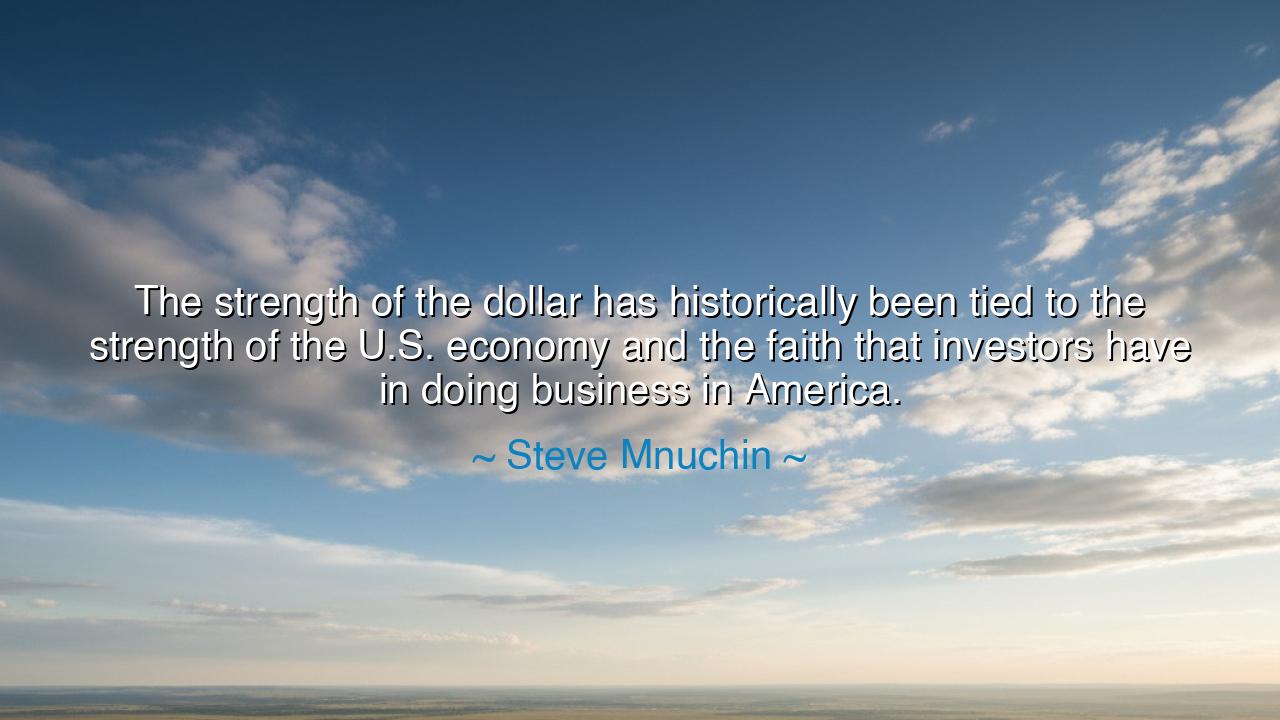
The strength of the dollar has historically been tied to the
The strength of the dollar has historically been tied to the strength of the U.S. economy and the faith that investors have in doing business in America.






Host: The light in the room is soft, a gentle glow emanating from an old desk lamp. The sound of traffic outside drifts in through the window, blending with the occasional murmur from the street below. Jack and Jeeny sit across from each other, a pile of papers between them. Their conversation is quieter now, more thoughtful, as if they’re weighing the gravity of the words they are about to exchange.
Jack leans forward, his eyes sharp, a small frown tugging at the corners of his lips.
Jack: “Steve Mnuchin’s right about the dollar. The strength of the U.S. economy has always been tied to how much faith investors have in doing business in America. When people trust the economy, they trust the dollar. It’s like a backbone for everything — from global trade to investment. But when confidence starts to slip, so does the strength of the currency.”
Jeeny: “But what does that really mean for the average person, Jack? Investors have faith, but the average American can’t always see how that translates to their own lives. The dollar’s strength might look impressive on paper, but for the everyday person, it’s about inflation, wages, and what the dollar can actually buy. It’s easy for those at the top to point to the strength of the dollar, but it doesn’t always reflect what’s happening on the ground.”
Host: There’s a slight tension in the air, the flicker of a nearby candle casting long shadows on their faces. Jeeny’s voice remains steady, but Jack’s is tinged with something more pragmatic, as if trying to untangle the complexities of the statement.
Jack: “I get that, Jeeny. It’s not all rosy, but think about it. A strong dollar means a stronger economy overall. More investment, more growth. When people have confidence in the U.S. economy, they want to do business here. And that leads to job creation, innovation, all that. The health of the dollar reflects the faith people have in America’s ability to handle economic challenges.”
Jeeny: “But what happens when that faith is misplaced? When the dollar’s strength doesn’t translate into better lives for the people who are struggling? All this talk about the strength of the currency doesn’t do much for someone who’s seeing their purchasing power diminish. The dollar might be strong in global markets, but what about the middle class here in the U.S. who are feeling the pinch from rising prices?”
Host: Jack pauses, his fingers drumming lightly on the table. Outside, the night has deepened, the sounds of the city growing softer. The conversation has turned into something more reflective, as if both are looking for a deeper understanding of a reality that is not as easily defined as numbers on a screen.
Jack: “You’re right, Jeeny. There’s a disconnect. A strong dollar doesn’t always mean a strong life for everyone. But you can’t ignore the fact that a stable, trusted dollar underpins the global economy. When confidence in the dollar weakens, it weakens the entire system. I think Mnuchin’s point is that trust in the U.S. economy and in its currency has a bigger impact than people realize. Faith in that system creates growth — not just for investors, but for everyone.”
Jeeny: “But what’s the point of growth if it’s not shared? A strong dollar should mean that the system works for everyone. I can see how investors benefit from it, but what about the people who don’t see any of that growth reflected in their lives? The dollar’s strength is only useful if it’s accessible. Without that access, it’s just a symbol of a system that isn’t working for the people who need it most.”
Host: The room is quiet now, the soft glow of the lamp contrasting with the deepening shadows. Outside, the city is alive, but inside, the debate has slowed, allowing for a moment of introspection. Jack’s eyes soften as he listens to Jeeny, the earlier intensity in his voice fading into something more thoughtful.
Jack: “You make a good point. It’s not enough to have a strong dollar if it’s not making a difference where it counts. A stable currency is important, but it needs to work for everyone. If the system is only benefiting the few, then what’s the use of all this economic strength? We can’t just measure success by the health of the dollar if that strength doesn’t trickle down to the people who need it most.”
Jeeny: “Exactly. A strong dollar should reflect a strong, inclusive economy. One where everyone can benefit, where people can see that their lives are improving along with the numbers. It’s about balance — economic strength can’t just be a tool for the wealthy. It needs to lift everyone up.”
Host: The conversation settles into a quiet hum, as if both have reached a shared understanding. The flickering light in the room seems to calm, the tension easing, as if the weight of their words has helped make sense of the complexities surrounding the strength of the dollar. Outside, the city continues to move, but inside, a quiet revelation hangs in the air — the dollar’s strength is only truly meaningful when it benefits everyone.






AAdministratorAdministrator
Welcome, honored guests. Please leave a comment, we will respond soon